Nikki Haley was once wildly popular in SC. Does she stand a chance against Trump there?
COLUMBIA, S.C. − The crowd erupted as Donald Trump made a halftime appearance at the Clemson-South Carolina football game.
His arrival at the stadium on Nov. 25, when nearly 80,000 fans had gathered to watch the Palmetto Bowl, had attendees careening over one another, trying to catch a glimpse of the former president.
“It was like Taylor Swift,” said Luke Byars, a University of South Carolina alum who was in the stands that weekend.
The clamor to take photos and videos of Trump was unlike anything Byars, a veteran Republican strategist who advised Sen. Tim Scott’s presidential campaign, had ever seen at a football game.
“If you were any other candidate, it would have to be deflating,” Byars said.
It was a spectacle, for sure, and one that Trump competitor and former South Carolina Gov. Nikki Haley tried to brush off at a rally in her home state two days later. Haley, a Clemson graduate and trustee, pointed out that her team won, after all.
“How’d it work out for the Gamecocks having Trump show up?” she asked.
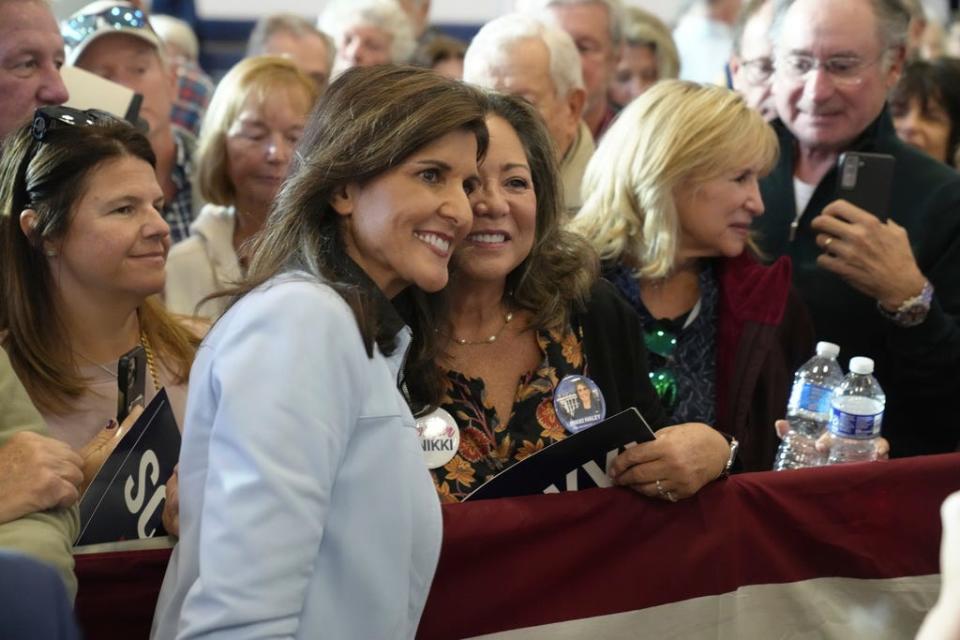
But the enthusiasm for Trump was emblematic of the formidable challenge that Haley – elected three times to the South Carolina Legislature and two times to its governor’s mansion – must find a way to overcome to score an upset in the Republican presidential primary.
GOP voters around the country are flocking to Trump, in spite of his being charged with 91 felonies across four criminal cases. And in South Carolina, a state on which Haley is staking her campaign, the former president had a 35-point lead as of November.
The first female governor of her state and first Indian-American woman to win a gubernatorial race anywhere in the country, Haley was once popular among South Carolina conservatives and looked upon nationally as a rising star.
Yet, it has been nearly a decade since 2014, when Haley was last on the ballot, and the Republican Party and its voters have changed dramatically under Trump.
“He's got a proven record. He did what he said he was going to do. And I'm old-school. When you tell me you're going do something and you do it, then you've got my loyalty,” said Ann Conder, a retired crisis counselor from Moncks Corner who has lived in South Carolina most of her life.
Conder, 69, could not say the same of Haley, who promised that she would not run against Trump for president and then did. “I think this country is not finished with Donald Trump,” Conder said.
Haley's rocky path in South Carolina; high hopes for New Hampshire
Conversations with likely Republican voters, activists and party chairs in South Carolina paint a troubling picture for Haley, who has lived just outside Charleston on Kiawah Island since moving back to the state in 2019.
She spent little time campaigning in South Carolina throughout the summer and fall, holding just six events there since May. She also came to the statehouse in October to file to appear on primary ballot. Neither she nor her campaign have tried to build relationships with county party chairs who live in her area and could help spread the word about candidacy.
Haley's campaign has instead directed its energy and resources to winning Iowa and New Hampshire – which have January elections that will be held roughly a month before the South Carolina Republican primary. It is spending $10 million on air time in the two states ahead of the fast-approaching contests. Haley trails Trump by an average of 27 points in New Hampshire. She is in third place behind Trump and Ron DeSantis in Iowa.
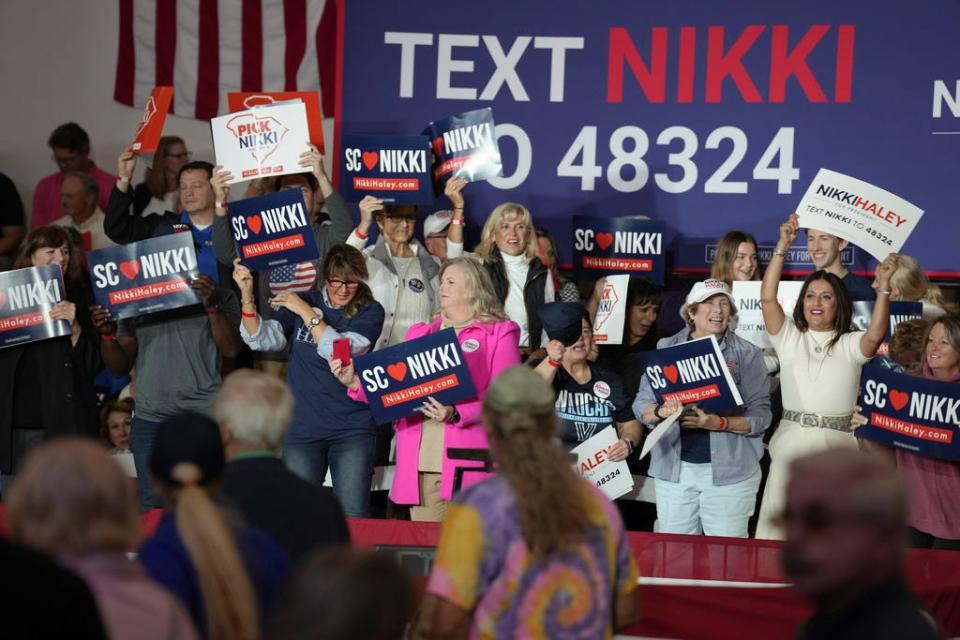
She aims to place high in Iowa and New Hampshire, where unaffiliated voters who can cast a ballot in the GOP primary could help her beat Trump. If she carries South Carolina on Feb. 24, Haley's supporters believe she can take that momentum into a flurry of contests in early March.
Haley, 51, has characterized her bid as one aimed at making “generational change." She told the more than 2,500 people at her rally in Bluffton, S.C., last month that they must accept that the GOP has lost the popular vote in the past seven out of eight presidential elections.
“I believe President Trump was the right president at the right time. I was proud to serve America in his administration. And I agree with a lot of his policies. But the truth is, rightly or wrongly, chaos follows him,” Haley said at the event, which her campaign says was her largest crowd so far.
A Winthrop University poll in November showed Trump, 77, winning more than half of South Carolina's registered Republicans. The former president had 52% support to Haley’s 17% and DeSantis’ 12%. Scott polled at 10% in the survey that was taken just before he ended his campaign. No other candidate had double-digit support.
A Tea Party candidate who ruffled feathers
Some of Haley's difficulties date back to her time as governor.
She ruffled feathers in the political establishment in 2010 when she ran for statewide office as a Tea Party candidate. Haley defeated South Carolina’s attorney general, lieutenant governor and a sitting congressman in the GOP primary. The competition and clashes she had with the state Legislature during her tenure in the governor's mansion earned Haley a host of political enemies in Columbia.
South Carolina Gov. Henry McMaster, who Haley bested in the gubernatorial primary, is backing Trump for president. So are the secretary of state, lieutenant governor, attorney general, treasurer and South Carolina House speaker.
Trump’s campaign boasted last month that it had received endorsements from “more South Carolina legislators than all opposing candidates combined,” including six who endorsed Scott and switched to him once the senator dropped out. DeSantis’ team has also bragged about converting Scott’s supporters, saying in mid-November that it had picked up 10 endorsements from state legislators and community leaders.
Haley's team says it has also benefited from Scott's withdrawal. Four state senators who had endorsed Scott are supporting Haley now, including the majority leader. Haley also picked up the endorsement of former Rep. Gresham Barrett, whom she defeated in the 2010 primary for governor, and the incoming mayor of Charleston.
One of Scott's former endorsers who is supporting DeSantis now, state representative Bill Taylor, told attendees of a DeSantis event in Prosperity last month that backing Haley was not an option for him.
“Nikki was never with me. I served with her, and bless her heart, as they say,” Taylor said. “But Nikki was always about her, not me, or not the Republicans that served in the House.”
Taylor said after the event that Haley was “combative” with the Legislature as governor. “We were a Republican majority and she continued to fuss with us, and I do believe she missed many opportunities for significant legislative achievements,” he said.
Haley's campaign declined to make the candidate available for an interview for this article. But in a phone call, South Carolina state Sen. Tom Davis, one of Haley’s longest and staunchest supporters, defended her record as governor. Haley brought the unemployment rate down, signed a law requiring photo identification for voters and required businesses to check the citizenship status of job applicants, Davis said.
"So I think as people are reminded of what she did during those six years, they start warming to her candidacy again," saidDavis, who represents Beaufort.
The Lowcountry is one of the areas where Haley’s support should be the strongest. Yet her campaign faces obstacles there, too.
Conversations with local leaders revealed that while Haley’s campaign sent a generic invitation to attend her campaign launch in Charleston in February, it has neither asked county party chairs for help recruiting volunteers nor put in requests for the candidate or campaign representatives to speak at their meetings.
Berkeley County Republican Party Chair Victoria Cowart said she has spoken with the Trump and DeSantis teams, but nobody from Haley’s camp has called her about connecting with the county’s GOP voters.
Cowart said she found out accidentally that Haley would be speaking at an event in Berkeley over the summer. She said she inquired with the campaign and has not heard from Haley’s team ever since.
Berkeley includes parts of the Charleston suburbs. Cowart said she did not attend Haley’s launch but always appreciated her as the state’s governor and cheered her on as U.N. ambassador.
“I loved her at the U.N. I loved her direct, on-point defense of the United States,” Cowart said. “We all did.”
Haley has not made an appearance at the center-right Charleston meeting, either, which boasts an attendance of 300 or more people each month. Of the 2024 candidates, only former Arkansas Gov. Asa Hutchinson spoke at the event, organizer Andrew Boucher said.
The political consultant, who also chairs the Charleston County Republican Party, said he expects other candidates to attend the meeting before the February primary.
DeSantis attacks Haley over liberal support
Haley’s absence from the state has given her opponents ample opportunity to rewrite her story and muddy the waters with Republicans who supported her as governor.
Her support for Trump as his United Nations ambassador in New York – a position she held for less than two years before resigning – is a concern for her home state’s primary voters.
“What worries me with Nikki Haley is the fact that, No. 1, she didn’t finish the four years of governorship. She left that to take the position that Trump gave her. And then she didn’t finish that term,” said Gladys Boland, a resident of Chapin who attended a DeSantis event in Prosperity earlier this month.
Boland says she plans to vote for Trump but finds DeSantis’ decision not to shut Florida down during the coronavirus pandemic appealing.
DeSantis was getting a second look by South Carolina primary voters at the Prosperity event after debating California Gov. Gavin Newsom for roughly 90 minutes on Fox News the night before.
The Florida governor sought to use the renewed interest in his campaign to undercut Haley’s support in her home state by connecting her to New York-based investment management firm BlackRock.
He brought up a breakfast Haley attended last month with Wall Street executives, including BlackRock CEO Larry Fink. DeSantis assailed the company for its environmental, social and governance (ESG) investment strategy and accused BlackRock of using its perch to push for cultural and societal changes that bypass electoral accountability.
Trump looked to the firm for help during the pandemic, he said, “and now Haley is meeting with the head of BlackRock in New York City … and she is now the one that the liberal Wall Street people are saying, 'This is our candidate.'”
DeSantis told the audience of about 250 that they should “be very afraid” of Haley’s popularity with corporate executives. “If those are the people supporting her,” he said, “I would be very skeptical of that, because they don’t have your interests at heart.”
The charge stuck with his audience, including retired Prosperity resident Sally Hutto.
Hutto said she’s a Haley fan who supported her in previous elections and is considering voting for her now. Haley was a good governor, she said, and helped keep the country out of wars when she was at the U.N.
But the BlackRock attack gave her pause, and Hutto said she would be looking into the claim.
“He’s pretty convincing. Everything he said I agree with,” Hutto said of DeSantis’ platform.
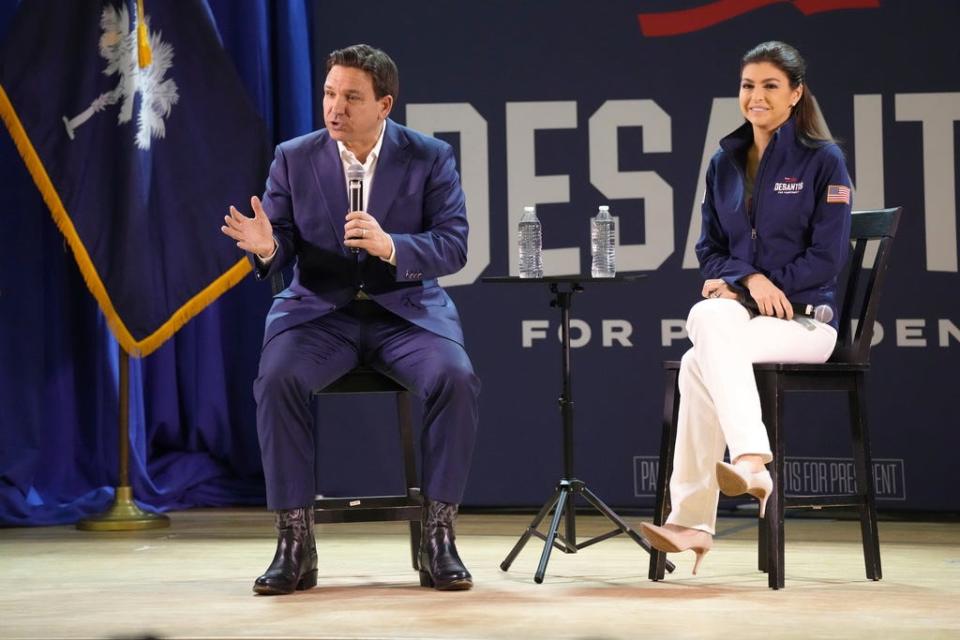
In an appearance on Fox News later that day, Haley batted away the criticism from DeSantis as a desperate attack from a losing candidate and welcomed the support of independents and Democrats such as JPMorgan Chase CEO Jamie Dimon, who had publicly encouraged business leaders and liberal Democrats earlier in the week to help Haley defeat Trump.
Haley offered a similar defense at last week’s primary debate, where her donor support came under attack from entrepreneur Vivek Ramaswamy, as well as DeSantis.
“They’re just jealous. They wish that they were supporting them,” Haley shot back.
Davis said after DeSantis’ initial attack that the Florida governor was coming after her because he is “steadily sinking” and “starting to flail about” as he tries to recover lost support.
“I think it's just inevitable that after the first two contests in Iowa, New Hampshire, it's going to be, clearly, a binary choice between former President Trump and Nikki Haley,” said Davis, the Beaufort-area state senator.
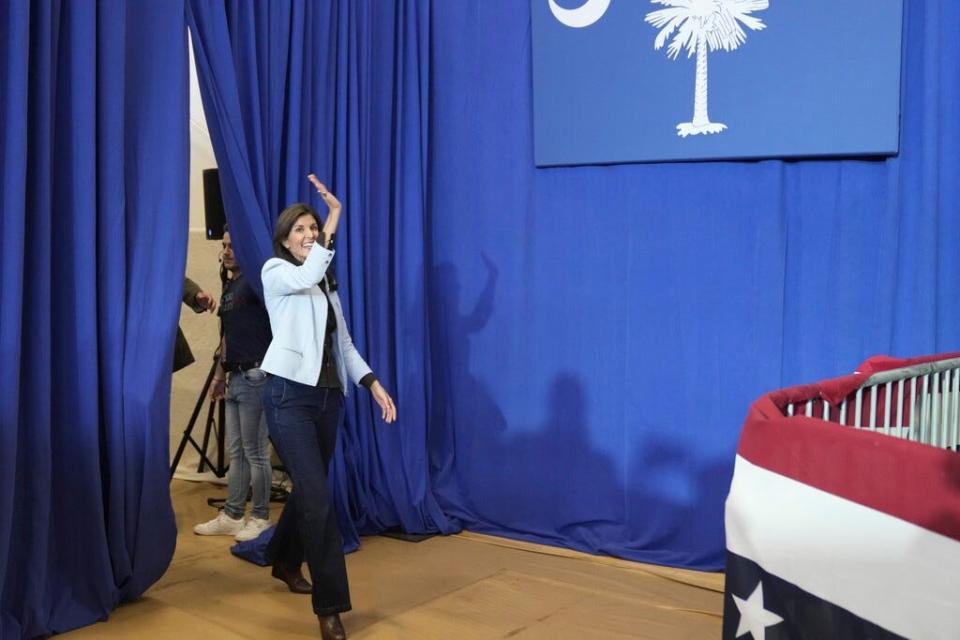
Haley gets a crucial grassroots endorsement
Haley received a much-needed boost when Americans for Prosperity Action, a Koch-backed grassroots organization, endorsed her candidacy at the end of November.
Since endorsing Haley, AFP Action says its activists have reached out to 20,000 voters in South Carolina through door knocking and phone calls.
Earlier in the year, the group sent mailers to prospective Republican primary voters in South Carolina telling them the way to “stop Biden” from winning a second term was “by letting go” of the former Republican president. The mailer asked in bold, white lettering: “ARE YOU WILLING TO RISK IT ALL ON TRUMP?”
Emily Seidel, a senior adviser to the group, said in an interview that AFP Action endorsed Haley because it believes she can win both the GOP primary and the general election against President Joe Biden.
Trump’s support is soft, and conservatives are open to voting for somebody else, Seidel said. “The key is, heretofore, somebody has needed to prove to them that they are also capable of winning, and advancing the things that they care about. And at this point, we believe that that person is Nikki Haley.”
Haley has pledged to cut taxes for the middle class, reign in federal spending and reform Social Security and Medicare, which is “music to the ears” of conservative activists in early voting states, Seidel said.
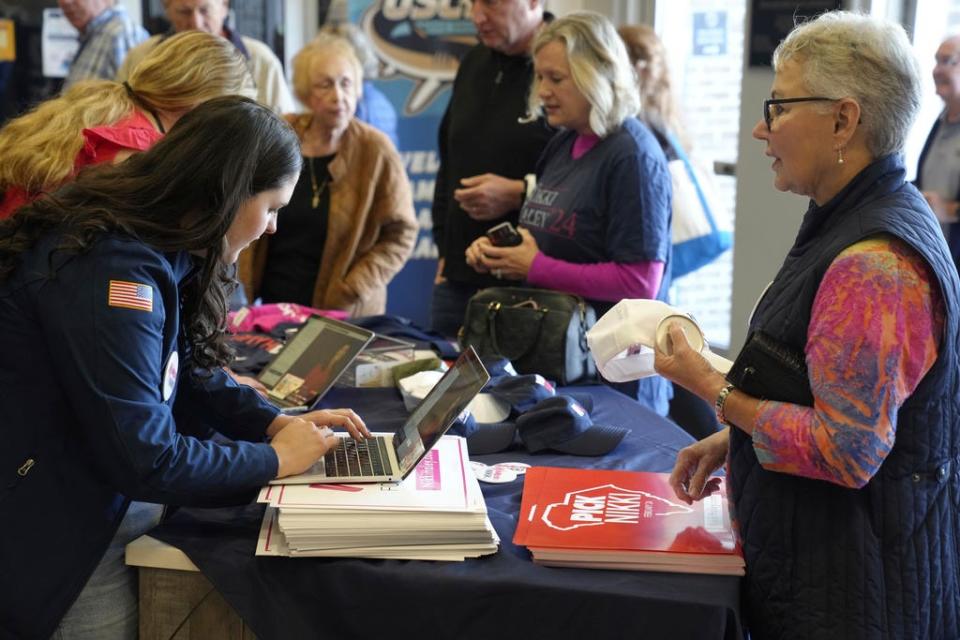
Foreign policy has also been a bright spot for Haley, even among voters who say they are leaning toward other candidates. It helped her stand out early on in a field of current and former governors looking to topple Trump.
"Nikki is somebody who's very much a classical conservative, she believes in limited government, individual liberty, economic prosperity and a strong American presence abroad," Davis said. "In some respects, she's a throwback to sort of classic conservatism, while some of the party has moved in a more populous direction."
At a GOP debate in November, Ramaswamy referred to Haley as ”Dick Cheney in 3-inch heels” over her steadfast support for Israel and Ukraine. He compared her again to George W. Bush’s vice president at a debate last week and slammed her as a “fascist neocon.”
His attacks on Haley are resonating with some voters. Prosperity resident Rene Toney, 66, said after DeSantis’ event that Haley’s foreign policy positions lead her to believe the former U.N. ambassador “is more of a Bush-lite, a conservative-lite.”
Haley has been called worse names. She overcame attacks on her faith, her ethnicity and unsubstantiated allegations about her marriage to win her party’s nomination for governor in 2010. She went on to win reelection four years later.
Yet, she has been no match for the former president.
Beaufort County’s Republican Party has been surveying its roughly 70 precinct chairs on the presidential primary since April. Although it found that Trump was at 49% in the beginning, by the time that Haley held her event there in November, he had increased his support to 68%. DeSantis was at 19% in the latest survey, Haley was at 11% and Ramaswamy was at 2%.
Xiaodan Li, who represents Beaufort County on the South Carolina GOP's state executive committee, said local leaders’ emotional connection to Trump and continued support for his policies are behind his dominance of the race.
“This is still pretty much a Trump country,” Li said.
This article originally appeared on USA TODAY: Haley was wildly popular as SC governor. Can she beat Trump there?


